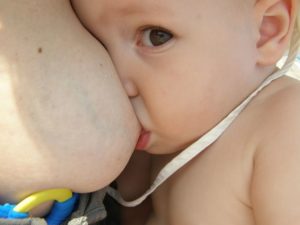While many women find breastfeeding to be a smooth period, the process can cause anxiety for new mothers, who feel their baby nurses very little and aren’t sure if they’re feeding their child properly.
If you want to reduce difficulties with breastfeeding, I have a suggestion: I recommend having a pre-consultation with a breastfeeding specialist to receive personalized guidance that’s tailored to your needs with your baby. Click here to learn more!
My Baby Nurses Very Little, Is That Normal?
It’s all part of the biology of breastfeeding. Babies have small stomachs, and can only take a small amount of milk with each feed, which is why it may seem like the baby is nursing very little1.
Babies are also able to adjust the fat levels in milk through breastfeeding. When a baby nurses a small amount but more frequently, the milk contains more fat.
Why does this matter? Well, a baby’s brain is growing more rapidly now than at any other time in life2, and the nutrients required for optimal brain development are found in the fatty portion of breast milk.
Babies often pause in the middle of breastfeeding, leading mothers to wonder whether the baby is getting enough to eat. Frequently, the pause is a natural part of breastfeeding, though some less rhythmic pauses can indicate the baby is distracted or uncomfortable.
My Baby Nurses a Lot, Is That Normal?
Frequent breastfeeding simply means the baby is healthy and normal. They are doing what they need to do to help you produce lots of milk. That’s because a baby who nurses a lot effectively stimulates the mother’s breasts to build a good milk supply.
To improve your milk production, ideally you should breastfeed on demand. It’s important to know that this won’t last forever. Once your milk supply is well established and your baby’s stomach has grown, they won’t need to feed as often.
If My Baby Nurses Very Little, How Can I Tell If It’s Enough?
Since the mother cannot see how much milk the baby is actually taking in during breastfeeding, it’s difficult to measure exactly how much they’re getting. Regardless of whether your baby nurses a little or a lot, you can determine if they’re getting enough to nourish them.
Nursing a small amount is not an indication that the baby isn’t getting enough milk. The best way to know if they’re feeding well is by monitoring their weight and growth.
Amount and color of urine and wet diapers, along with regular bowel movements, also show that a baby is getting plenty of milk. If your baby’s diapers are constantly dry, the amount of stool is very small, or there is less than normal weight gain, it’s important to seek medical help for an evaluation3.
And What About Pauses During Nursing?
Pauses during breastfeeding are an indicator that the baby is feeding efficiently. A baby who is used to nursing develops a characteristic sucking pattern, usually marked by opening the mouth wide, followed by a pause, and then a slight closing of the mouth.
The pause indicates the baby is sucking correctly. Slightly longer pauses of two to three seconds suggest the baby is swallowing more milk. By watching the baby’s sucking during breastfeeding, you may be able to hear them swallowing or see a slight movement in the throat, which can help you notice if your baby is nursing a little or a lot.
Could It Be Gas?
Breastfed babies tend to have less gas than bottle-fed babies, but they can still have gas or reflux when eating.
Sometimes mothers get confused, thinking when the baby nurses little or takes a few seconds break, it’s a sign the baby is done eating, when usually the baby just needs a change of position.
If your baby nurses very little and has a long pause during feeding, hold the baby upright or on your chest and gently pat his back. After he burps, offer the breast again to see if he wants to keep nursing.
Baby Who Sleeps While Nursing – What To Do?
In a way, it’s normal for the baby to fall asleep while nursing, but what you should avoid is the baby falling asleep as soon as they latch on. If that happens, it’s very likely the baby will nurse very little and won’t be able to feed as much as they need.
Generally, newborns (especially preemies) sleep many hours during the day, no matter the situation. This happens because they get tired very easily. The smaller or lighter the baby is, the more easily he’ll get tired, especially while feeding.
There are different types of babies who sleep while nursing:
- Baby who sleeps while feeding and stops without finishing – Some babies latch on, feed a little, and then fall asleep before they’ve gotten enough, and soon after, they’ll wake up wanting to feed again.
- Baby who sleeps while feeding and stops nursing – Others latch on, feed enough in a short time, and then fall asleep with a full tummy.
- Baby who sleeps while feeding but keeps nursing – Many babies fall asleep in the middle of a feed but still keep nursing. They drift off, seem to stop sucking, but soon start again, and this goes on for a long time.
- Baby nurses little and sleeps a lot – Even worse than a baby who falls asleep and stops feeding is a baby who sleeps so much and nurses so little that mothers can’t even get them to latch on as often as they need.
Taking care of a baby’s breastfeeding is actually a complex task and demands a lot of attention from moms. But this job becomes easier if you know that regardless of how much your baby nurses, he/she is reaching their ideal weight and growth.
So, is paying attention important? Yes, but enjoying the moment matters even more.
See Also: How Many ml of Milk Should I Give My Baby?
Photos: Irene












